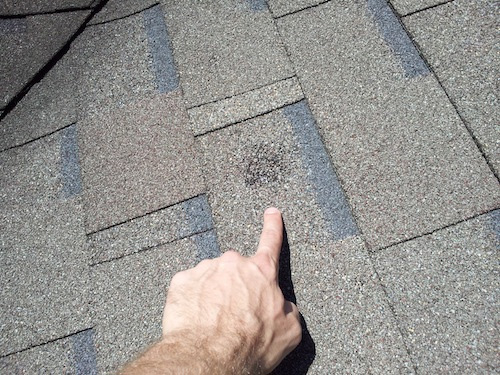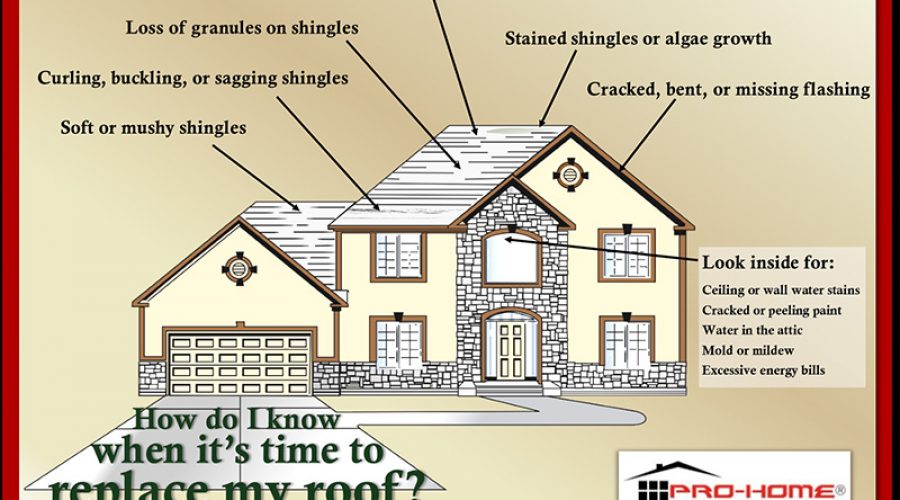It’s spring and after a heavy spring storm, many homeowners find themselves in need of hail damage repair on their roof. In fact, State Farm Insurance reports Illinois as ranking second among the other states in the amount of hail storm damage reported in 2014. There were 43,821 damage claims due to hail that year.
In the Chicago area, the average lifespan of a shingle roof is 15-20 years, which can be lower than other areas of the country where the weather is milder. Midwest weather is notoriously ruthless on roofs all year round, from wild storms in the warmer months to ice and blizzard conditions during the winter.
Even high quality shingles yield to wild winds and merciless hail. Then, when it’s all over, you may not even realize you have storm damage until you start noticing the telltale signs, inside and out.
Exterior Inspection for Hail Damage to Roof
If you suspect that you may have some roof hail damage, it is best to call a qualified roofing company to do an inspection of your roof. They can tell how and if your shingles have been compromised. They can also tell what this damage may have done (or will do) to the interior of your house. While on your roof, the professional will look for the telltale signs of hail damage:
- Missing shingles. High winds can peel the shingles completely off the roof, exposing the roof’s underlayment and requiring immediate replacement.
- Lifted and curling shingles. High winds can break the seal of the shingles and make the roof penetrable to wind-driven rain.
- Dents or pockmarks in shingles. Driving hail can scrape off the protective granules on the shingles that are necessary to protect a roof from rain and sun damage.
A good inspector will consider the condition of the whole roof before making a recommendation whether or not repair or replacement is the best decision.
Interior Inspection for Roof Hail Damage
Inside the home, the homeowner should be vigilant for signs that there are problems with the roof. Especially if the roof has not been inspected by a professional, the storm damage may not be obvious for several weeks, or even months after the storm hit, when the water damage begins show. Vigilant homeowners can look for the telltale signs inside the house that indicate damage to the roof. Look for:
- Water stains on the ceiling or walls, caused by seepage from the damaged roof
- Cracked or peeling paint, caused by moisture in the walls
- Visible water in the attic, on the beams, insulation or finished areas
- Mold or mildew growth, especially in attics or other dark enclosed areas
- Excessive energy bills, caused by escaping cool or heated airIt’s spring and after a heavy spring storm, many homeowners find themselves in need of hail damage repair on their roof. In fact, State Farm Insurance reports Illinois as ranking second among the other states in the amount of hail storm damage reported in 2014. There were 43,821 damage claims due to hail that year.In the Chicago area, the average lifespan of a shingle roof is 15-20 years, which can be lower than other areas of the country where the weather is milder. Midwest weather is notoriously ruthless on roofs all year round, from wild storms in the warmer months to ice and blizzard conditions during the winter.Even high quality shingles yield to wild winds and merciless hail. Then, when it’s all over, you may not even realize you have storm damage until you start noticing the telltale signs, inside and out.Exterior Inspection for Hail Damage to Roof

- If you suspect that you may have some roof hail damage, it is best to call a qualified roofing company to do an inspection of your roof. They can tell how and if your shingles have been compromised. They can also tell what this damage may have done (or will do) to the interior of your house. While on your roof, the professional will look for the telltale signs of hail damage:
- Missing shingles. High winds can peel the shingles completely off the roof, exposing the roof’s underlayment and requiring immediate replacement.
- Lifted and curling shingles. High winds can break the seal of the shingles and make the roof penetrable to wind-driven rain.
- Dents or pockmarks in shingles. Driving hail can scrape off the protective granules on the shingles that are necessary to protect a roof from rain and sun damage.
- A good inspector will consider the condition of the whole roof before making a recommendation whether or not repair or replacement is the best decision.Interior Inspection for Roof Hail DamageInside the home, the homeowner should be vigilant for signs that there are problems with the roof. Especially if the roof has not been inspected by a professional, the storm damage may not be obvious for several weeks, or even months after the storm hit, when the water damage begins show. Vigilant homeowners can look for the telltale signs inside the house that indicate damage to the roof. Look for:
- Water stains on the ceiling or walls, caused by seepage from the damaged roof
- Cracked or peeling paint, caused by moisture in the walls
- Visible water in the attic, on the beams, insulation or finished areas
- Mold or mildew growth, especially in attics or other dark enclosed areas
- Excessive energy bills, caused by escaping cool or heated air
- Any roof that has fallen in disrepair will show these signs, but so can a younger roof that has been damaged by a hail storm. Look for the signs inside your home. If you need a professional to take a look on top of your roof, we would be glad to help. Call the experienced roofing experts at Pro-Home Services.
Any roof that has fallen in disrepair will show these signs, but so can a younger roof that has been damaged by a hail storm. Look for the signs inside your home. If you need a professional to take a look on top of your roof, we would be glad to help. Call the experienced roofing experts at Pro-Home Services.

